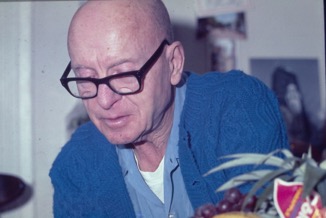Uncle Ted
05/12/20 03:20

I do not know, however, the circumstances by which Uncle Ted was attracted back to Montana after living a large part of his adult life in California. He grew up in Montana and his siblings stayed in Montana, but he somehow ended up in California. Then he moved back, not to his home town, but to the town where my parents lived. My mother’s family was a close family and we got together with her sisters and their families and aunts and uncles and cousins were part of our gatherings. But as I have grown older, I realize that there are large pieces of the story that I don’t know.
Uncle Ted’s story interests me because he made the move and a major life adjustment fairly late in life. He must have been in his late 50’s or early 60’s when they moved back to Montana. The couldn’t have had many financial resources, as he didn’t formally retire, but went straight to work. He was a very frugal man and didn’t borrow money, and lived comfortably with little. His small house and several sheds he built in the back yard were filled with useful items that he had obtained at little or no cost. He saved things others discarded. An old license plate from a car was shaped and fitted with a handle and became a dustpan. A bit of scrap tin roofing became a funnel. He always meticulously maintained his car and had reliable transportation. His last car became my first car and saw us through college and graduate school without major problems.
Now that I’m at the age that he was when I was in my teenage years, I wonder about the dynamics of what must have been a major life change for him. Uncle Ted was a private person. He seemed to enjoy living alone and didn’t need to go out very much. He loved tinkering in his garage or in our father’s shop and he made a lot of the tools that he used.
I do not know the story behind the way he marked his tools. He etched, carved or otherwise marked each tool with the roman numeral 8. VIII is the mark on the wooden handled screwdrivers that are in my toolbox today. He didn’t buy many new things, but acquired used items and made them work.
Uncle Ted made his own version of “instant” coffee. He would take a pound of ground coffee, dump it into a large soup pot half full of water and boil the coffee until all that remained was a thick sludge in the bottom of the pot. He would transfer that sludge into a quart jar which he kept in the refrigerator. When he wanted a cup of coffee, or on the rare occasions when guests came to his house, he would take a teaspoon full of the coffee mixture, put it in a cup and fill the cup with boiling water. I tasted it on a couple of occasions. It must have been an acquired taste. I never acquired it.
Although he understood machinery and how things worked, he couldn’t have known the specifics of the John Deere parts system prior to having gone to work for our father. He quickly became very good at helping farmers and ranchers solve their problems. They would bring in the stories of what had broken and he would go through the manuals and help them determine what they needed. He learned to anticipate what parts would be requested and keep the inventory appropriate to the demand. In the days before computers and overnight delivery it was essential to have the items needed on hand. A combine broken down during harvest or a hay rake that wouldn’t work during haying season were real problems that needed to be solved quickly with what could be obtained from the local dealer. Uncle Ted became the “go to” guy when things broke. He could make up custom hydraulic lines, patch an inner tube, drill out and replace a rivet, and much more.
One winter he slipped on the ice. He took an old pair of shoes back into the shop, drilled the heels and installed studs designed for snow tires. He fashioned a pair of walking sticks with spikes on the ends and walked securely wherever he wanted even when it was icy outside. The shoes had to be left at the door when he came inside, but that was no problem. He hand sewed a couple of extra pockets inside of his coat that held his indoor shoes.
Uncle Ted had a grey upholstered stool upon which he sat behind the parts counter when he was sharpening tools. He could swivel the stool and access the parts manuals that sat on the counter. That stool moved from Montana to Idaho and from Idaho to South Dakota and from South Dakota to Washington and now sits in the shop I share with our son at his farm. I call it my pondering chair. It is where I sit when I need to pause my work and think of a new way to solve a problem. When a part doesn’t quite fit or a new way to get a piece of wood into just the right shape arises, I sit on the chair and ponder the solution.
The chair connects me to an ongoing story - one that I know only in part.
